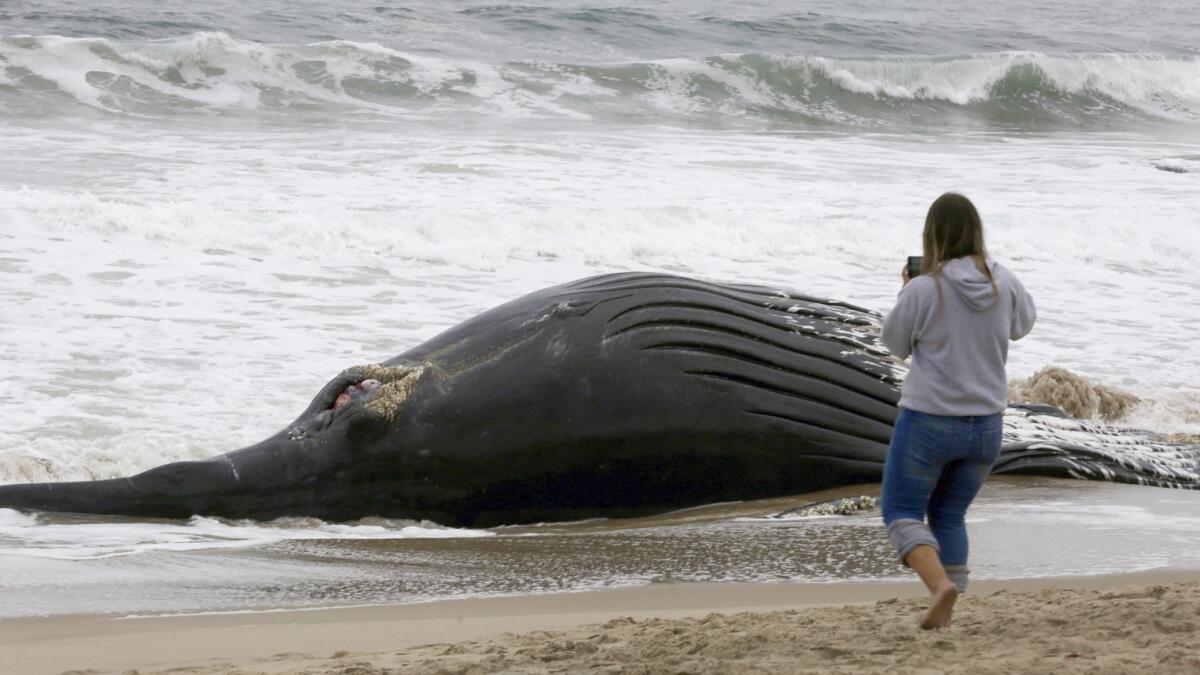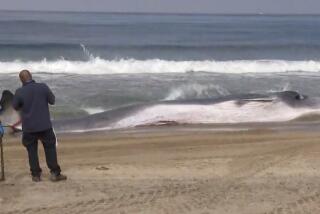Wally the whale is towed out to sea a day after washing ashore

Crews were busy removing a 22-ton humpback whale that washed ashore at Dockweiler State Beach.
Wally the whale was towed into the sea by two Los Angeles County lifeguard boats Friday evening at Dockweiler State Beach, just a day after he washed ashore.
Carol Baker, spokeswoman for the Los Angeles County Department of Beaches and Harbors, said the carcass was taken into the water about 6:30 p.m.
”It took a while, but the high tide during the evening helped us into getting it back into the water,” she said.
Thousands of beachgoers were expected to arrive for the long Fourth of July weekend, making it a priority for workers to tow the carcass back into the water were it could properly decompose.
“It’s starting to smell … and decompose pretty rapidly,” said Los Angeles County Lifeguard Capt. Ken Haskett.
The 45-foot-long, 22-ton whale carcass washed ashore about 8 p.m. Thursday, Haskett said. The male cetacean was between 10 and 20 years old when he died, the county lifeguard department tweeted.
Biologists with the National Marine Fisheries Service visited the carcass before noon Friday and identified the creature as a humpback that was tagged in August. The whale’s name, they said, was Wally.

Already, Wally’s arrival on the beach has created a blubbery spectacle, and county crews say they are eager to have him removed.
Officials asked the public to stay 200 feet away from the carcass Friday, and onlookers crowded along the the edge of the taped perimeter to watch researchers and county work crews deal with the whale.
Lifeguards, working with the county’s Department of Beaches and Harbors, decided to tow the carcass far out to sea, where it will be clear of shipping lanes and where currents will keep it away from the beach. Natural decomposition and marine life will do the rest, Haskett said.
Crews used a tractor to build a sand berm on the land side of the whale, then slowly pushed the berm — and the carcass – into the ocean. From there, a line was tied around the whale’s tail (the strongest part of its body) and boats would pull it at least six miles off the coast, Haskett said.
Towing the carcass avoids the more grisly and gross option of chopping it up and shipping it to a landfill or burying it, officials said. (In April, a 50,000-pound gray whale washed up at San Onofre State Beach, drawing scores of onlookers. The whale ultimately was cut up by excavators and hauled away in dump trucks.)
As workers made preparations to remove Wally on Friday afternoon, 10-month-old Selena De La Cruz sat with her parents and thumped her small fists into the dark, wet sand. She grinned happily, oblivious to the wonder on her parents’ faces as they looked at the dead humpback whale 15 feet away from where they sat.
“It’s already getting a fishy, fishy smell,” said her father, Michael De La Cruz, 25. The girl’s mother, Reina Saucedo, 25, snapped away with her iPhone camera.
“Should we go?” De La Cruz asked.
“No, I want to take one of you two with the whale in the background,” Saucedo said.
The family had driven from Carson to Dockweiler at 7 a.m., and never intended to meet the carcass of a whale.
“We just wanted to get out of the house today,” Saucedo said. “Our daughter loves the beach, and when we saw the whale, we tried showing her, but obviously she doesn’t understand.”
Twitter: @JosephSerna and @alexiafedz
ALSO
Bid to free tangled blue whale off California coast fails after whale swims away
2,600 buildings threatened by Northern California wildfire, forcing residents to flee
Fossils of a sperm whale up to 12 million years old unearthed at Irvine landfill
UPDATES:
7:18 p.m.: This article was updated with confirmation of the carcass taken back to sea.
1:52 p.m.: This article was updated with comments from beachgoers.
1:35 p.m.: This article was updated with comments from bystanders.
12:36 p.m.: This article was updated with additional information about the whale’s removal.
This article was originally published at 8:23 a.m.
More to Read
Sign up for Essential California
The most important California stories and recommendations in your inbox every morning.
You may occasionally receive promotional content from the Los Angeles Times.











